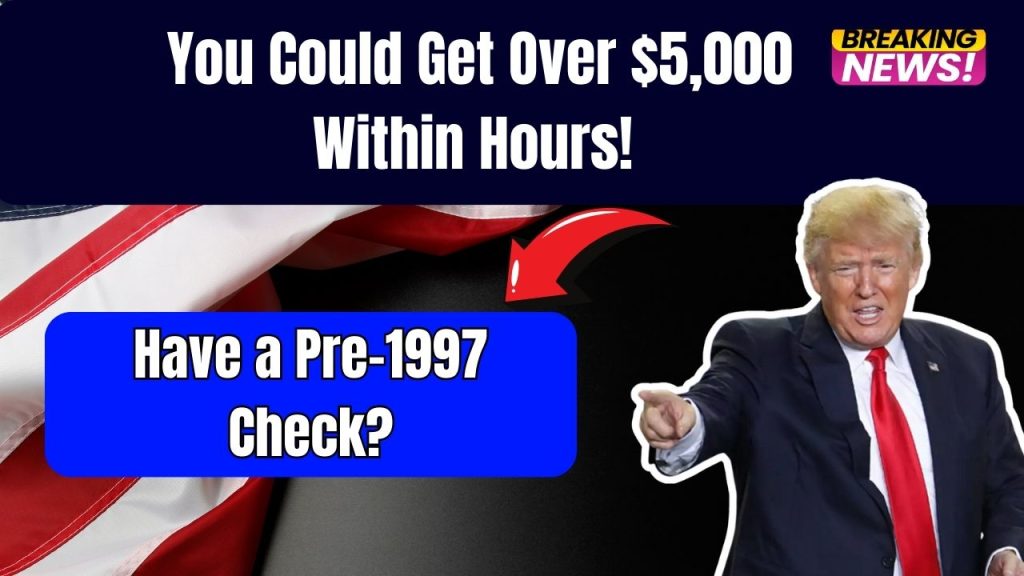Have a Pre-1997 Check: In recent months, headlines like “Have a Pre-1997 Check? You Could Get Over $5,000 Within Hours!” have been circulating on social media, websites, and even through direct messages. These catchy claims have grabbed the attention of millions across the United States, offering hope of a financial windfall from long-forgotten checks. But are these claims credible, or are they simply too good to be true?

In this comprehensive guide, we’ll break down exactly what these headlines mean, explore the origins of these viral messages, explain what you should do if you think the claim might apply to you, and provide step-by-step instructions on how to protect yourself from scams. Whether you’re a curious reader, a concerned family member, or someone looking to make sense of a suspiciously generous message, this article will provide clarity.
Have a Pre-1997 Check
| Feature | Details |
|---|---|
| Claim | Pre-1997 checks could be worth $5,000+ |
| Origin | Viral messages and online headlines |
| Reality Check | No official government program confirms this payout |
| Risk | High potential for scams and phishing attacks |
| Recommended Action | Verify with official sources like FTC.gov or your financial institution |
| Who It Affects | Primarily older adults or estate inheritors with outdated checks |
| Financial Tip | Always verify before acting on unexpected financial claims |
The buzz around “Have a Pre-1997 Check? You Could Get Over $5,000 Within Hours!” may sound tempting, but it’s largely unsupported by facts. While checks do not stay valid forever, there are authentic ways to claim old funds through state-run unclaimed property databases or with help from legal experts.
Stay educated, cautious, and informed. When in doubt, consult with a professional and always turn to official resources for guidance. Your financial health depends on knowing the difference between a windfall and a well-disguised scam.
What Is the “Pre-1997 Check” Claim All About?
The idea that a pre-1997 check could be worth thousands of dollars has taken off online, thanks to social media posts, clickbait articles, and email forwards. These messages often use language that creates a sense of urgency, such as “Act fast before the deadline!” or “Millions eligible and don’t even know it!”
But what’s actually going on? Most of these claims are based on misinterpretations of financial regulations, old laws, and isolated cases that have been exaggerated for viral effect. According to the Consumer Financial Protection Bureau (CFPB), checks issued by financial institutions typically carry a validity period of 180 days (or six months) unless otherwise stated.
Once a check exceeds that timeframe, it is considered stale-dated and may not be honored by banks or credit unions. While there are rare cases where reissuance is possible—particularly in legal settlements or estate disbursements—there is no broad federal program authorizing payouts for expired checks.
Is There Any Truth to This?
Let’s break it down with some verified facts and official sources:
- Checks expire. Under the Uniform Commercial Code (UCC), banks are not required to cash a check more than six months old.
- Unclaimed property laws vary by state but typically allow individuals to search for and reclaim forgotten funds, such as uncashed paychecks or closed bank accounts.
- Expired checks cannot be redeemed without proper legal steps, and even then, there’s no guarantee of payout.
You can conduct a search for unclaimed property in your name by visiting Unclaimed.org, a legitimate resource run by the National Association of Unclaimed Property Administrators (NAUPA). It’s one of the few trustworthy platforms approved by state treasuries.
How to Check If You Have a Legitimate Claim
If you suspect that you or a loved one might have an old check or forgotten funds from the past, here are the exact steps you should take:
1. Use State Unclaimed Property Portals
Go to your state’s unclaimed property division or use multi-state platforms like MissingMoney.com. These tools allow you to enter your name and search across participating states for unclaimed paychecks, utility refunds, closed bank accounts, and more.
2. Inspect the Check or Financial Document
If you have a physical check or financial record, examine it closely. Look for the issuer’s name, the date, and the memo line. Contact the issuing organization directly. Some may be willing to reissue a check if it’s tied to legitimate funds and proper documentation is provided.
3. Watch for Red Flags and Scams
Many of the viral messages linking to this $5,000 claim are actually phishing attempts. Be cautious of:
- Unofficial domains (e.g., .coms claiming to be the IRS or banks)
- Requests for your Social Security Number, banking details, or government ID
- Poor grammar, generic greetings, or aggressive language
Only share sensitive information on verified .gov, .org, or official financial institution websites.
4. Get Professional Help if Inheritance Is Involved
If the funds may be part of an inheritance or estate, it’s best to consult with an estate attorney or certified financial advisor. They can guide you through the probate process and help determine your eligibility to claim old financial assets.
Real-Life Examples of Legitimate Financial Recovery
While the viral check payout story is questionable, there are real and legal ways that people recover forgotten money:
- IRS Tax Refunds: Taxpayers often forget to claim refunds, especially if they didn’t file returns. The IRS allows refunds to be claimed up to three years after the original due date.
- Dormant Bank Accounts: Financial institutions are required to turn over inactive accounts to state unclaimed property departments, often after 3-5 years of inactivity.
- Settlement Checks or Insurance Payouts: If a company settles a class-action lawsuit or an insurance policy was paid out, checks may go uncashed and revert to the state. These can still be claimed with identification and supporting documents.
- Utility and Rent Deposits: Old deposits for utilities or rented apartments are commonly forgotten. Many of these end up in state databases and are available to claim.
Why This Viral Claim Is Risky and Often Harmful
There’s a reason why cybersecurity experts and financial advisors are warning people to steer clear of these types of claims. The psychology behind them preys on hope, urgency, and the allure of easy money.
Here’s how they pose risks:
- Identity Theft: Fake websites often collect personal data for fraudulent use.
- Malware and Phishing: Clicking on suspicious links can install harmful software or redirect you to unsafe websites.
- False Hope: These claims can create emotional stress, especially for older adults or those in financial distress.
The best defense? Skepticism and verification. Always cross-check links, verify the legitimacy of the claim, and consult with professionals if needed.
$7,500 Tax Credit for Home Renovations in April 2025 – Check How to Qualify
PFD or IRS Refunds? Check Which One Will Give You the Biggest Payday!
$7,500 Tax Credit for Home Renovations in April 2025 – Check How to Qualify
FAQs About Have a Pre-1997 Check
Is this check payout real?
No. There is no federally-backed program providing $5,000 for pre-1997 checks. Most checks expire after six months.
Can I cash an old check from 1997 or earlier?
Only in rare cases. Some issuers may agree to reissue a check if proper proof and reasoning are provided.
Where can I find unclaimed money in my name?
Search reputable sites like Unclaimed.org and MissingMoney.com. These are secure and supported by state governments.
What documents do I need to reclaim unclaimed funds?
Typically, proof of identity, a Social Security number, and sometimes documentation like utility bills or probate records.
How do I report a scam website or email?
You can report scams to the Federal Trade Commission (FTC) and your state attorney general’s office.











